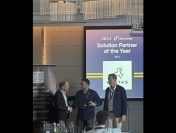 The Emirates Group reaffirms its commitment to protecting wildlife and habitats, on the occasion of World Wildlife Day. It also shone the spotlight on conservation efforts across the organization at an online Environment Forum for its global employees.
The Emirates Group reaffirms its commitment to protecting wildlife and habitats, on the occasion of World Wildlife Day. It also shone the spotlight on conservation efforts across the organization at an online Environment Forum for its global employees.
During the forum, experts from the Dubai Desert Conservation Reserve (DDCR), Emirates One & Only Wolgan Valley in Australia and Emirates SkyCargo spoke about the work being done to protect endangered species and habitats in Dubai, restoration efforts following aftermath of the Australian bushfires, and how the airline was doing its part to foil wildlife trafficking across its network.
In addition to reducing emissions and consuming responsibly, the preservation of wildlife and habitats is one of the three pillars under The Emirates Group’s environmental sustainability strategy. The Group believes that future generations should enjoy seeing wildlife in the wild, and that the world’s beauty and biodiversity is an inspiration for travel.
The Emirates Group has funded and supported Dubai Desert Conservation Reserve (DDCR) that collaborates with local and international educational and research institutions with over 30 biodiversity projects completed so far. DDCR also promotes sustainable tourism and provides authentic desert experiences while educating visitors on the delicate nature and the living heritage of Dubai. Prior to the pandemic, the reserve responsibly hosted close to 290,000 tourists a year, making it the most visited protected area in the region, explains the agency.
In Australia, Emirates has been supporting the protection of Australia’s wilderness and bush for over 12 years through the conservation based Emirates One&Only Wolgan Valley located in the World Heritage-listed Greater Blue Mountains region.
Emirates SkyCargo claims to step in the fight against illegal wildlife trafficking and exploitation. In 2016, Emirates signed the Buckingham Palace Declaration and joined the United for Wildlife Transport Taskforce in the fight against the illegal wildlife trade. It is also a partner of ROUTES (Reducing Opportunities for Unlawful Transport of Endangered Species).
Emirates SkyCargo says to adopt a zero tolerance policy on illegal wildlife trade which includes big cats, elephants, rhinos and pangolins, among other types of contraband animal cargo and has implemented a complete ban on hunting trophies for the Big-4, even in cases where the shipment may be considered legal under CITES* rules.
Additionally, Emirates SkyCargo has also invested in awareness campaigns, as well as education and training on issues associated with illegal wildlife trade for its teams. Employees across the business are encouraged to report suspicious activity through designated internal channels for investigation, and the intelligence gathered is shared with relevant authorities as well as used to benefit the worldwide data collection for further wildlife trafficking prevention purposes.




